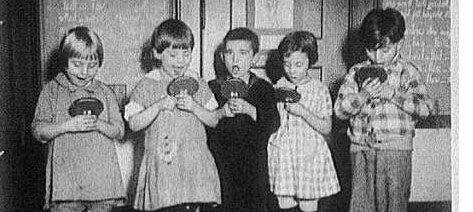 |
| COMM
120P Digital Media Pedagogy
Brian Goldfarb, Fall 2013
Dept of Communication, UCSD
|
|
|
Course Schedule:
Note:
Readings are due before the class. Readings are subject to change by the instructor.
You will be notified as early as possible of any changes.
week:
1 | 2 | 3
| 4 | 5 |
6 | 7 | 8
| 9 | 10
Week One (Sept 27): Introduction
- Course overview: scope and requirements
- Site Visits at HTMMA: Sign up for school site times
- Weekly journals on WebCT
- Intro to Learning Activity Project
[Site visits begin on Tuesday, Oct 1, please arrive
at 9:15am for orientation at
High Tech
Middle Media Arts--see the resources page for site description and directions]
Week Two
(Oct 1 & 3): Distraction and New Media Forms
Reading:
- Now You See It, "Intro" and "Chapter 1" (pp 1-43)
Further reading (optional):
- Lankshear and Knobel, "Do We Have Your Attention?" http://everydayliteracies.net/attention.html
- Lankshear and Knobel, "Introduction" in Digital Literacies—Concepts, Policies and Practices p1-15
- Buckingham, "Defining Digital Literacy: What Do Young People Need to Know About Digital Media?" in Lankshear and Knobel, Digital Literacies p73-90
Week Three
(Oct 8 & 10): Multimedia pedagogies
Reading:
- Brian Goldfarb, Visual Pedagogy: Media
Cultures in and beyond the Classroom, "Introduction," pages1-22, and "Chapter 4: Peer Education and Interactivity" pages107-139 (TED)
Week Four
(Oct 15 & 16): Transforming the Classroom and Remixing the Curriculum
Reading:
- Now You See It, "Chapter 3: Project Classroom Makeover" (pp 61-104)
Further reading (optional):
- Erstad, " Trajectories of Remixing: Digital Literacies, Media Production, and Schooling" in Digital Literacies, p177-202
- Joseph Tobin, "An American Otaku"
, pages 106-127, Digital Diversions: Youth
Culture in the Age of Multimedia, edited by Julian Sefton-Green
- Erstad, Gilje and de Lange, "Re-mixing Multimodal Resources"
Week Five
(Oct 22 & 24): Standards vs Standardization: challenges of assessment
Reading:
Further reading (optional):
Week Six
(Oct 29 & 31): Universal Access: visuality, [dis]ability and digital learning
Reading:
- Patricia A. Dunn and Kathleen
Dunn De Mers: "Reversing Notions
of Disability and Accommodation: Embracing Universal Design in Writing Pedagogy
and Web Space," Kairos, Volume 7, Issue 1 online: http://english.ttu.edu/kairos/7.1/binder2.html?coverweb/dunn_demers/index.html
- Chis Abbott, "Writing the Visual"
pages 31-46, in Silicon literacies : Communication, Innovation and Education
in the Electronic Age, ed., Ilana Snyder , (TED)
Week Seven
(Nov 4 & 7): Balancing safety and independence: young people's access to online content in classrooms, libraries, and at home
Reading:
Further reading (optional):
Week Eight
(Nov 12 & 14): Games, play and learning
Discuss lesson plans with HTMMA student focus groups during site visits.
Reading:
Further Reading (optional):
- Cornelia Brunner, Dorothy Bennett,
and Margaret Honey, "Girl Games and Technological Desire," chapter
3 in Justine Cassell and Henry Jenkins, From Barbie to Mortal Kombat. available online through
Roger when on campus or via web proxy. http://cognet.mit.edu/library/books/view?isbn=0262032589
Week Nine
(Nov 19 & 21): Intellectual property, plagiarism, collaboration, and the public good
Discuss lesson plans with HTMMA student focus groups during site visits.
Reading:
- Lankshear and Knobel, "Digital Literacy and the Law: Remixing Elements of Lawrence Lessig’s Ideal of “Free Culture'" in Lankshear and Knobel, Digital Literacies, p 279-306 (TED)
- Rebecca Moore Howard,
"Forget About Policing Plagiarism. Just Teach."
Further Reading:
Week
Ten (Nov 26)
[No Site Visits this week]
Week
Eleven ( Dec 3, & Dec 5):Learning with Social Network Media
Completed lesson plans and write-ups due. Class Presentations of Lesson Plans
Reading:
- Explore Alex Juasz's Interactive Book: Learning From YouTube
- Viera Lorencova, "YouTube Dilemmas: The Appropriation of User-Generated Online Videos in Teaching and Learning"
Further Reading (optional):
Final Exam (Dec 11, 8-11am) --presentations of lesson plans

